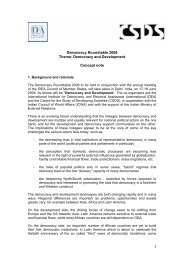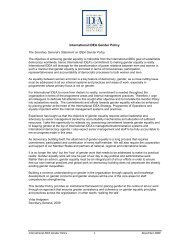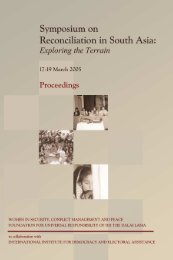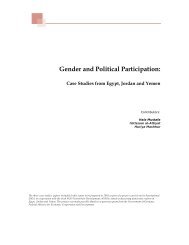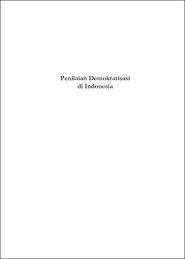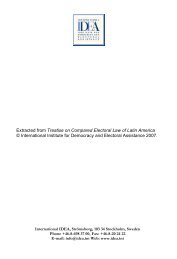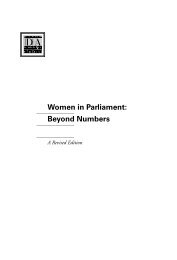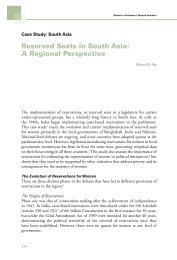The Role of State Constitutions in Protecting ... - International IDEA
The Role of State Constitutions in Protecting ... - International IDEA
The Role of State Constitutions in Protecting ... - International IDEA
Create successful ePaper yourself
Turn your PDF publications into a flip-book with our unique Google optimized e-Paper software.
FEDERALISM, DIVERSITY<br />
AND MINORITY RIGHTS:<br />
WHAT CAN WE LEARN FROM INDIA?<br />
Yogendra Yadav<br />
Introduction<br />
Two general remarks on what lessons can the experience <strong>of</strong> Indian federalism yield<br />
for the lawmakers <strong>in</strong> a neighbor<strong>in</strong>g country like Burma for the purposes <strong>of</strong><br />
ensur<strong>in</strong>g diversity and protection <strong>of</strong> m<strong>in</strong>ority rights.<br />
…it is desirable and<br />
essential to look around at<br />
available models and<br />
practices so that one<br />
can orient one’s search<br />
more clearly.<br />
...most successful<br />
democracies made<br />
<strong>in</strong>stitutional <strong>in</strong>novations. If<br />
there is one lesson <strong>of</strong><br />
comparative politics to carry<br />
it is the uniqueness <strong>of</strong> each<br />
place and the need to tailor<br />
the constitutional-legal<br />
frame to fit the specificities<br />
<strong>of</strong> each place.<br />
First a po<strong>in</strong>t about comparisons and what they can yield. <strong>The</strong>re was a time <strong>in</strong> the<br />
discipl<strong>in</strong>e <strong>of</strong> Political Science and Law that people under-emphasized how much<br />
could be learnt from comparative constitutions. <strong>The</strong> pendulum has swung to the<br />
other extreme by now and I th<strong>in</strong>k there is a real danger <strong>of</strong> over-do<strong>in</strong>g the<br />
comparative constitutions, especially s<strong>in</strong>ce the bus<strong>in</strong>ess <strong>of</strong> design<strong>in</strong>g democracies<br />
has turned global <strong>of</strong> late. With a check list model <strong>of</strong> democracy dom<strong>in</strong>at<strong>in</strong>g the<br />
democratic imag<strong>in</strong>ation, there is an all round search for “best practices”. I am not<br />
sure it is a very happy development for democratic imag<strong>in</strong>ation. While democracy<br />
is expand<strong>in</strong>g all over the world (and I really hope it comes sooner than later <strong>in</strong><br />
Burma), our notion <strong>of</strong> what it means to be a democracy it actually shr<strong>in</strong>k<strong>in</strong>g. I<br />
fear that sometimes comparisons contribute to this tendency. <strong>The</strong>re is <strong>of</strong> course<br />
very little to be said <strong>in</strong> favor <strong>of</strong> re-<strong>in</strong>vent<strong>in</strong>g the wheel. To that extent it is desirable<br />
and essential to look around at available models and practices so that one can<br />
orient one’s search more clearly. At the same time, it is essential to remember that<br />
most successful democracies made <strong>in</strong>stitutional <strong>in</strong>novations. If there is one lesson<br />
<strong>of</strong> comparative politics to carry it is the uniqueness <strong>of</strong> each place and the need to<br />
tailor the constitutional-legal frame to fit the specificities <strong>of</strong> each place.<br />
It is necessary to be rem<strong>in</strong>ded <strong>of</strong> some basics about any constitution.<br />
◆<br />
◆<br />
◆<br />
<strong>The</strong>re is no pure or true or genu<strong>in</strong>e form <strong>of</strong> any <strong>in</strong>stitution like federalism<br />
or democracy. <strong>The</strong> worth <strong>of</strong> the any constitutional design must be judged<br />
solely by how it addresses the specific requirements <strong>of</strong> the people it is<br />
meant to serve, and not by how well it follows an orig<strong>in</strong>al design.<br />
A constitution is embedded <strong>in</strong>to a social structure with its cultural<br />
pattern. <strong>The</strong> same <strong>in</strong>stitutional design can yield one set <strong>of</strong> results <strong>in</strong> a<br />
society and quite different <strong>in</strong> another, one set <strong>of</strong> results <strong>in</strong> one period and<br />
quite different <strong>in</strong> another. Unfortunately the current drive for global<br />
recipes for democratization <strong>of</strong>ten forgets this basic lesson <strong>of</strong> history.<br />
Institutions work depend<strong>in</strong>g on how they are made to work by the<br />
political force. Politics is all about bend<strong>in</strong>g and stretch<strong>in</strong>g the rules <strong>of</strong> the<br />
game. Every legal-constitutional provision has political consequences. <strong>The</strong><br />
20



